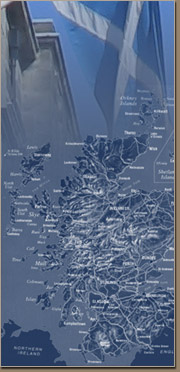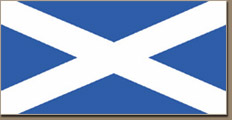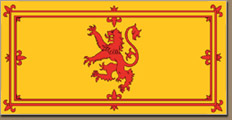Scotland in a nutshell - geographical and demographical data

 cotland is part of the "United Kingdom of Great Britain and Northern Ireland", which is the official term the Britons use for their country. Within the UK, Scotland is located in the North of Britain and - with a size of 78,765 km², and therefore slightly bigger than Bavaria - takes up about a third of the total area of Britain.
cotland is part of the "United Kingdom of Great Britain and Northern Ireland", which is the official term the Britons use for their country. Within the UK, Scotland is located in the North of Britain and - with a size of 78,765 km², and therefore slightly bigger than Bavaria - takes up about a third of the total area of Britain.
It has a population of about 5.2 Million people (about half the number of Baden-Württembergs's population), which is only around 10 percent of the total population of the United Kingdom. The population density of Scotland - 65 residents per km² - is comparably thin, compared, for instance, to Germany (223 residents/km²). Furthermore, most of Scotland's population if concentrated in the urban areas in the South, while the North is very thinly populated, and several areas in the Northern Highlands or on the Scottish Islands are almost uninhabited.
Besides the mainland, the Scottish territory includes 790 islands, mainly situated in front of the North-Western coast. The largest islands are Harris, the Isle of Skye and Mull. All Scottish islands are very thinly populated; the Isle of Skye, for instance, almost twice as big as the largest German island Rügen, has only about 10,000 residents (compared to about 76,000 on Rügen). Most of the Scottish islands, more than 600, are completely uninhabited.
Scotland's two largest cities are Glasgow (680,000) and the capital Edinburgh (443,000). In overall UK, Glasgow is the fourth largest city after London, Birmingham and Leeds (Edinburgh is ranked 8th).
Language
 he most common language in Scotland is, of course, English, which, during the centuries, and under the strong influence of England's culture, economical power and its political superioriry to Scotland, has displaced the former native tongue of the Scots - Gaelic - in almost every region. Gaelic, a language derived from Celtic origin, is today only spoken by less then 70,000 people in Scotland, the majority of which located on the islands of the Hebrides in the North-West of Scotland.
he most common language in Scotland is, of course, English, which, during the centuries, and under the strong influence of England's culture, economical power and its political superioriry to Scotland, has displaced the former native tongue of the Scots - Gaelic - in almost every region. Gaelic, a language derived from Celtic origin, is today only spoken by less then 70,000 people in Scotland, the majority of which located on the islands of the Hebrides in the North-West of Scotland.
Although there are only few native speakers of Gaelic left, and although the language has recently lost its status as 'language' in the official interpretation by the European Union, there are strong tendencies to preserve Gaelic as a language and as a part of Scottish identity and culture.
However, the Scottish dialect of English, Scots, is considered to be a quasi-language of its own as well. Indeed, Scots, with a remarkable amount of specific vocabulary and several unique Grammar rules, differs quite a lot from Standard English, and even with a very profound knowledge of Standard English it is very hard to understand Scots: for non native speakers, I'd say, it is usually a quite impossible thing. So it's not surprising that the famous movie 'Trainspotting' was showed with subtitles in several cinemas in the U.S.; and in 'Trainspotting' the guys were not even talking Scots but just English with a strong Scottish accent.
Currency
 he United Kingdom does not participate in the "Euro-Zone", and therefore the British Pound (Pound Sterling) is still the official currency in Scotland. One Euro is about 0.66 Pound Sterling (exchange rates from May 2004). The major bank institutes of Scotland issue their own banknotes, and the Scottish Pounds therefore have a different look from those that are used in England, Wales or Northern Ireland (for more details about the Scottish money, see the money-section on this website).
he United Kingdom does not participate in the "Euro-Zone", and therefore the British Pound (Pound Sterling) is still the official currency in Scotland. One Euro is about 0.66 Pound Sterling (exchange rates from May 2004). The major bank institutes of Scotland issue their own banknotes, and the Scottish Pounds therefore have a different look from those that are used in England, Wales or Northern Ireland (for more details about the Scottish money, see the money-section on this website).
National symbols
 cotland has its own National flag, called the cross of St. Andrew or 'the Saltire'. It is a white cross on a blue background and is reported to be one of the "oldest national flags of any country, dating back at least to the 12th century". The Scottish flag is also represented in the "Union Jack", the national flag of entire UK. Both the blue ground and the white frames that border the red crosses of Saint George (England) and Saint Patrick (Ireland) were adopted when Scotland, England and Ireland where politically unified - although today only the county of Ulster (Northern Ireland) is represented with the Saint Patrick's cross in UK's national flag.
cotland has its own National flag, called the cross of St. Andrew or 'the Saltire'. It is a white cross on a blue background and is reported to be one of the "oldest national flags of any country, dating back at least to the 12th century". The Scottish flag is also represented in the "Union Jack", the national flag of entire UK. Both the blue ground and the white frames that border the red crosses of Saint George (England) and Saint Patrick (Ireland) were adopted when Scotland, England and Ireland where politically unified - although today only the county of Ulster (Northern Ireland) is represented with the Saint Patrick's cross in UK's national flag.
Another flag that is associated with Scotland is the so called 'Royal Flag of Scotland', or 'Rampant Lion'. It's often used as a second national flag, although its use as such is not officially acceded by British authorities, and its original use was limited as a sign of the monarch or for several official institutions. However, it's frequemtly seen in Scotland, and foreigners might be familiar with it by Scottish football fans, who usually fly the "Rampan Lion" together with the St. Andrew's cross.


Another Scottish symbol that is quite common in Scottish seals or insigna is the thistle, the national flower of Scotland. The use of this sign has its origin the 15th century and used to be a symbol of defence.
The Scotsmen and the Englishmen
Although Scotland ceased to be an independent state more than 300 years ago, its inhabitants have never lost theirselve's conception as being part of a Scottish nation with a clear differentiation especially to their neighbours in the south, the English. Therefore, in case a careless foreigner calls a Scotsman an Englishman, he or she would definitely take this as a bad insult. This lack of differentiation, not really important to people from continental Europe who, referring to the British people, often just call them English, is not appropriate at all in Britain itself - unless one's eager to make himself unpopular amongst the 'natives'. Inhabitants of Scotland are Scots, or Britons, but never ever English.Until today, there are a few people in Scotland who are convinced it would be better for Scotland to regain its total independence from the United Kingdom and to abandon the "Union of Crowns", the historical unification of England and Scotland 1701 under one monarch, which, as they claim, was a great mistake that should be undone - notwithstanding the fact that 300 years of union at last turned out to be a gain for both countries in both manners of culture and economical strength; whereas Scotland, always the smaller and weaker nation in Britannia, profited even more by the Union than their English neighbours. However, it's the long history of mutual hostilities between Scotland and England in the past and the probably everlasting Scottish inferiority-complex towards the English that'll keep alive a certain alienation and mistrust of the Scots regarding to their southern neighbours. There's, of course, no danger Scottish people would ever dream of dividing off from the UK - as Scots and Englishmen are much too much unified in their self-perception as being Britons in one single state. However, this will never keep both people from making snide remarks towards the others from time to time; just to show off one's still different and proud of it.
Related Links (external links opening in a new browser window)




